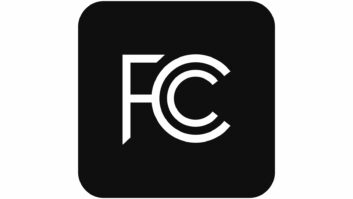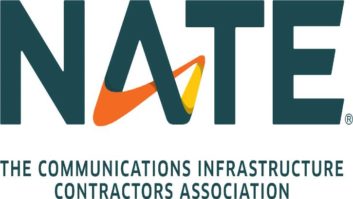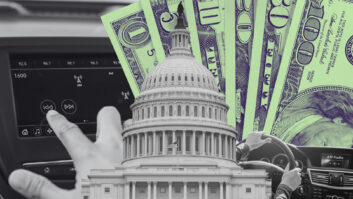
Craig Parshall, shown speaking on Capitol Hill.
A year ago, just prior to the inauguration of President Barack Obama, Radio World asked Craig Parshall, senior vice president and general counsel of the National Religious Broadcasters, about the incoming administration. He described NRB’s attitude at the time as “cautiously observant.”
On the cusp of NRB’s annual convention in Nashville, we asked again. Parshall says many of the organization’s fears have been realized after the first year of Obama’s term.
“We have been surprised, if not shocked, about the degree of federalization that has been brought to bear on so many avenues impacting the media.”
Parshall pointed in particular to the Federal Communications Commission, which has a Democratic majority and a new chairman in Julius Genachowski.
NRB President/CEO Frank Wright, Vice President of Government Relations Bob Powers and Parshall have met with Genachowski and his staff.
“I was very interested with how carefully he listened, how well he understood a lot of the technical aspects of the issues, and that he is at the vanguard of some monumental changes in media and media control from a regulatory standpoint,” Parshall said of the chairman.
NRB is watching the commission’s staff appointments and initiatives. As one example, Parshall cites FCC Associate General Counsel and Chief Diversity Officer Mark Lloyd, a focus of controversy for some FCC critics. NRB is among those who describe Lloyd as “diversity czar.”
“A lot of the folks who are being appointed are coming from an academic background,” he said. “Mr. Lloyd was from the Center for American Progress, he was a scholar over there.” CAP is a progressive think tank.
When an academic goes to work for a regulator, Parshall said, “They usually come with a very firm theoretical outlook on what the media ought to look like, and then they feel like the federal government is the way to bring that to bear.”
What government does worst
Parshall offered examples, beginning with attempts to stem a decline in journalism standards.
“The federal government — and by that I mean the FCC and the Federal Trade Commission — have both said that, come spring of 2010, they’re going to get together and figure out how to solve the decline in journalism standards.
“And as I understand it, they’re going to be looking not only at the economic problems behind print newspapers, which are beginning to disappear, but also how to imbue higher and better journalism standards among media outlets. And the federal government’s going to have a role in this.”
Is there a legitimate role for government in this arena?
“I think what we need to do is have a conversation between the federal government and media on how the government can facilitate, but get out of the way of, the growth of media — rather than coming in and saying, ‘We’ll be another form of bailout for you, we’ll set standards, we’ll have a new level of governance over media, we’ll define journalism standards and figure out how to fix it.’
“That is what the government does least best of all.”
Parshall thinks the best step the federal government can take is “to figure out how to fertilize the growth, rather than subsidize the growth. And that’s a big difference.”
No ‘Fairness’
One item on NRB’s watch list a year ago was speculation that Democratic leaders would seek to reinstitute the Fairness Doctrine. Parshall credits NRB, the National Association of Broadcasters and media talk shows with pushing that discussion out of political favor.
Two years ago, he said, two thirds of the public supported reinstitution of the Fairness Doctrine while one third were against it. “After a year of informing the American public, those polls showed an exact opposite result: a third of American people thought it was a good idea, two thirds thought it was a bad idea.”
Those polls were enough to take the Fairness Doctrine off the political agenda, he believes. “I think if politicians in general can only do one thing, they can see which way the wind is blowing.” However, critics of the Fairness Doctrine also worry that ongoing talks about ensuring broadcast “localism” might serve as a back-door way to accomplish the same thing the Fairness Doctrine sought to do.
Another issue Parshall warned about a year ago was legislating hate speech within a hate crimes bill. Parshall said he and Powers “worked for three years on behalf of NRB, spending a lot of time on Capitol Hill, warning legislators that they had to be careful of creating a new federal crime bill that had free speech implications for religious communicators and so forth.”
When the Matthew Shepard and James Byrd Jr. Hate Crimes Prevention Act passed in the fall as a rider to a defense authorization bill and was signed into law by President Obama, it included an amendment by Sen. Sam Brownback, R-Kan., to strengthen protections for free speech and religious exercise.
“Our job on hate crimes now is to make sure it’s enforced in the way that the sponsors of that bill, and the supporters and those who voted for it on Capitol Hill, intended,” Parshall said.
“I’ve put my comments down in written form to the attorney general’s office suggesting how they should inform their U.S. attorneys on how to enforce that, with civil liberties issues in mind, because federal prosecutors have a huge amount of discretion on how they prosecute and who they prosecute.”
Free market
Regarding diversity of media ownership, another issue that often echoes around Capitol Hill, Parshall said NRB’s position depends on the definition.
“If by ‘diversity’ you mean quotas, we’re against them. If by ‘diversity’ you mean equal opportunity for all comers, then we’re all for it.”
A subject that also keeps knocking at the media regulatory door is relaxation of media ownership limits.
NRB in Nashville

NRB 2010 will be held in Nashville Feb. 27–March 2 at the Gaylord Opryland Resort & Convention Center.
Dave Keith, vice president of operations for the organization, said Christian media professionals need to stay engaged, “not only to advance their own work and ministry but to also share the burden of defending our rights to speak freely and openly about the gospel of Jesus Christ to a generation in desperate need of answers.”
Among events of note are Saturday Boot Camps on Feb. 27 that focus on radio, television, Internet, church media, leadership and international issues. The radio Boot Camp includes a discussion of raising money for ministries through digital media with lessons from the Obama campaign, and another on tips for coaching air talent. The Internet Boot Camp explores topics like how ministries can use mobile devices like iPhones and Android to communicate their message, and the role of Twitter and Facebook.
NRB is launching an “International Exchange” on Feb. 28. The concept is to pull together people who may be ministering in certain regions, such as the Middle East, with others interested in those areas. Tuesday morning’s Innovation Exchange is similar but broken down by industry groups, such as Internet, radio, TV, etc., rather than region. An Internet Evangelism event will explore ways to be effective in sharing faith electronically.
The “Broadcast Essentials” track on March 1 includes discussions about online evangelism, pornography, search engines and media relations; what the Dave Ramsey organization is doing with social media and radio; crisis communication; how the Web can “save and empower” a ministry; funding broadcast ministries; things to know to direct a worship service; the impact of litigation threats; and how Jesus and Paul might minister to your listeners.
The opening session features remarks by Del Tackett and Jim Garlow; the closing session features Chuck Colson. Prominent convention speakers include Phil Cooke of Cooke Pictures discussing how to turn a dream of ministry work into a successful venture and Bob Lepine, co-host of “Family Life Today,” on ways to connect with readers, listeners and viewers online.
Show information is at www.nrbconvention.org. “We want to make sure that local broadcasters, including Christian broadcasters, small broadcasters, are not squeezed out of markets,” Parshall said.
“On the other hand, we’re also believers in a relative free market outlook, and we do believe that what’s good for most media is going to be good for us in terms of the economics of the broadcast community.”
How is the economy affecting Christian broadcasters now?
“Not getting any worse, that’s the new success story. If you can hold your losses to what you had the year before, you’re not losing.
“I think we’re in just about the same fix we were in last year. But I am sensing that more of our ministries are making cuts in terms of staffing and budgets,” which is difficult. “Remember, the noncoms started this period with very small, skeletal, modest staffing.”
Many religious broadcasters also are affected by the debate over performance rights, which Parshall called “a huge problem. That, in addition to the copyright royalty board rulings on the Web streaming rates, is an attack on the survival of radio.”
Still, there’s growth in Christian radio. “I’ve seen modest expansion, enough so that I’m able to say that I’ve not seen universal stagnation. I’m seeing growth, but it’s very geographically based, and it’s very modest — growth in the Southeast, but [in] other areas, the Rust Belt and some other places, we’ve seen less growth.”
Another issue that popped onto broadcasting’s radar screen was the FCC’s Notice of Inquiry in December titled “Data Sought on Uses of Spectrum,” which grew out of an earlier public notice about management of spectrum for broadband uses.
The idea that TV licensees might lose at least a portion of their spectrum set off a firestorm within the broadcast industry. In mid-January, the commission clarified that any spectrum give-back would be voluntary, but Parshall remains cautious.
“Until we get a more definitive explanation from the FCC on exactly what they mean when they say their spectrum plan gives broadcasters ‘flexibility’ in making choices about their spectrum, NRB remains guarded about whether this spectrum allocation is truly voluntary.
“The concept of true, non-coerced ‘choice’ by broadcasters seems to collide with the theories of recently-appointed FCC broadband guru Stuart Benjamin, who has written that the FCC should consider an effort to ‘reclaim spectrum devoted to lower valued uses from the existing licensees, to allocate it to higher valued uses.'”
The issue of value is one that particularly worries Parshall and NRB. He wonders if the word refers to the value of programming, the value of the number of people using the service on the spectrum (“regardless of how trivial the use”), the economic value or some other meaning.
Many NRB’s members, he said, while perhaps not measured by Arbitron or listed on NASDAQ, “provide, we would suggest, an invaluable service to the American society.”
“That is the first order of business that ought to be debated. Instead, the FCC’s saying, ‘Well, we’ll decide between competing values, depending on how we define value.’ And they haven’t told us how they’re going to decide it.”
Christian radio executives attending the upcoming NRB convention will no doubt discuss these and related topics. Among planned events are sessions titled “Today’s FCC Through the Looking Glass: What You Really Need to Know” and “American Religious Liberty and Free Speech at the Crossroad.” Topics of the latter, according to the convention Web site, may also include net neutrality, Supreme Court Justice Sonia Sotomayor, abortion, same-sex marriage and sexual orientation non-discrimination.
Also part of the convention is an annual Public Policy Debate that takes place Tuesday, March 2, between Barry Lynn, executive director of Americans United for Separation of Church and State, and Craig Parshall of NRB.












